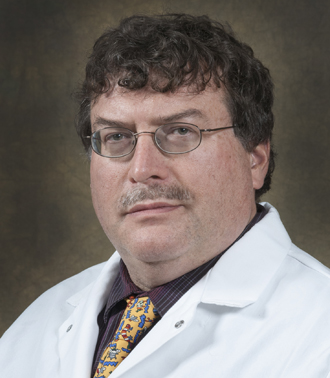Douglas Ruden, Ph.D.
Office Address
C.S. Mott Center for Human Growth & Development
275 E. Hancock
Position Title
Professor & Director of EpigenomicsJoint Appointments
Institute of Environmental Health Science & Department of PharmacologyAreas of Interest
Toxicogenomics of heavy metal exposure using Drosophila and human embryonic stem cell models.
Narrative Bio
Dr. Ruden’s first exposure to science was as an undergraduate researcher at Caltech. He first worked in 1980 in the laboratory of Dr. Ed Lewis on the regulation of the Hox gene Ubx by Polycomb Group (PcG) genes during Drosophila development. This lead to his career-long interest in Drosophila genetics and developmental biology. Dr. Lewis won the 1995 Nobel Prize in Physiology and Medicine for his research on Drosophila Hox gene regulation. In 1981, he worked during the summer for Dr. Eric Davidson where he learned molecular biology helped clone genes using the lambda phage. This work motived him to join a phage and yeast molecular biology lab as a graduate student. From 1981-1984, while still an undergraduate at Caltech, he worked for a new faculty, Dr. Carl Parker, on the Heat Shock genes in Drosophila. In Dr. Parker’s laboratory, he developed the first EMSA (electro-mobililty shift assay) with a eukaryotic transcription factor. He was awarded the top undergraduate research prize, a Silver Medal from the Royal Academy of Arts and Sciences, for his undergraduate research. His research was published in Cell in 1985 and has received over 250 citations.
Dr. Ruden will consider new PhD students for the 2020-21 Academic Year.
Laboratory Web Site
http://obgyn.med.wayne.edu/profile/bb2944Research
Douglas Ruden is interested in how early exposures to environmental toxins such as lead affect genome-wide DNA methylation and histone modifications. He collaborates on projects on several model organisms, from the fruit fly Drosophilia melanogaster, the water flea Daphnia, honey bees and killer bees, to human neonatal dried blood spots and embryonic stem cells. Laboratory techniques include: DNA methylation analyses (BS-Seq and Infinium) and histone modification analyses (ChIP-Seq and mDIP-Seq). His laboratory collaborates with the Applied Technology Genomics Core (ATGC) which has both low throughput and high throughput technologies to accommodate investigators needs, e.g. Solexa next-generation sequencing and Illumina Bead Arrays.
Publications
A complete list of Dr. Ruden's publications can be found at PubMed-Ruden
Post Graduate Training
- 1990-92 EMBO Postdoctoral Fellowship, Max Planck Institute for Molecular and Developmental Biology, Goettingen, Germany (mentor: Herbert Jaeckle)
- 1992-94 Alexander Von Humboldt Postdoctoral Fellowship, University of Munich, Munich, Germany (mentor: Herbert Jaeckle)
- 2015-Invited Speaker, Fourth Annual Sustainable Nanotechnology Organization Conference, Portland, OR.
- 2011-Invited Speaker, First Annual Cancer Cell Metabolism Conference, Discovery on Target, Boston, MA.
- 2011-5th Congress of the International Society of Nutrigenetics and Nutrigenomics, Hydroxymethylation Induction by Oxidative Stress, Beijing, China.
- 2011-Invited Speaker, Epigenetics World Conference, Boston, MA.
- 2011-Invited Speaker, Keystone Symposium, Epigenomics and Disease Susceptibility, Chapel Hill, NC.
- 2010-Invited Speaker, CSHL, NY, Banbury Research Conference on Epigenetics, Cold Spring Harbor, NY
- 2010-Invited Speaker, 26th International Neurotoxicology Conference, Portland, OR.
- 2010-Invited Speaker, International Epigenetics Conference, Dublin, Ireland.
- 2009-Invited Speaker, Tenth Anniversary Meeting on Environment and Hormones (eHormone), New Orleans, LA.
- 2009-Invited Speaker, Epigenetics Gordon Research Conference (Plymouth, NH)
- 2009-Invited Speaker, Michigan State University, Joseph Meites Seminar Series: Epigenomics in Drosophila and Humans.
- 2009-Invited Speaker, Symposium: National Evolution Synthesis Center (NES-Cent). Epigenetic Directed Genetic Errors and Neuroendocrine Signaling.
- 2008-Invited Speaker, Symposium: Michigan Society of Toxicology; Univ. Michigan. Toxicogenomics of Lead in Drosophila .
- 2008-Invited Speaker, “Developmental Origin of Health and Disease Symposium,” Univ. Michigan, MI.
- 2008-Invited Speaker, “Environmental Endocrine Disruptors,” Gordon Research Conference, Waterville, NH.
- 2007-Invited Speaker, “Hormone Action in Development and Cancer,” Gordon Research Conference, New London, NH.
- 2006-Keynote Speaker, “Advantages of Diverse Models in Neuroscience Biomedical Research,” Texas A&M University.
- 2006-Distinguished Faculty Investigator, UAB, School of Public Health.
- 2005-Invited Speaker, “Environmental Epigenetics,” NIEHS sponsored meeting, Duke University.
- 2005-Invited Speaker, German Society for Human Genetics, Halle, Germany.
- 2004-Invited Speaker, 128th Nobel Symposium, “Epigenetic Reprogramming in Development and Disease”, Stockholm, Sweden, .
- 2003-Invited Speaker, Samuel Lunenfeld Research Institute Seminar Series, University of Toronto.
- 1999-2000-Basil O’Connor Award, March of Dimes Birth Defects Foundation
Education
1980-84 B.S. in Chemistry & B.S. in Biology, California Institute of Technology
1984-90 Ph.D. in Biochemistry, Harvard University
Courses taught by Douglas Ruden, Ph.D.
Fall Term 2025 (future)
Winter Term 2025
Fall Term 2024
Winter Term 2024
Fall Term 2023
- CB7220 - Molecular Biology of Cancer Development
- IBS7015 - Interdisciplinary Cell and Molecular Biology
- MGG7015 - Introduction to Genetics
- MGG7020 - Metabolism and Disease
